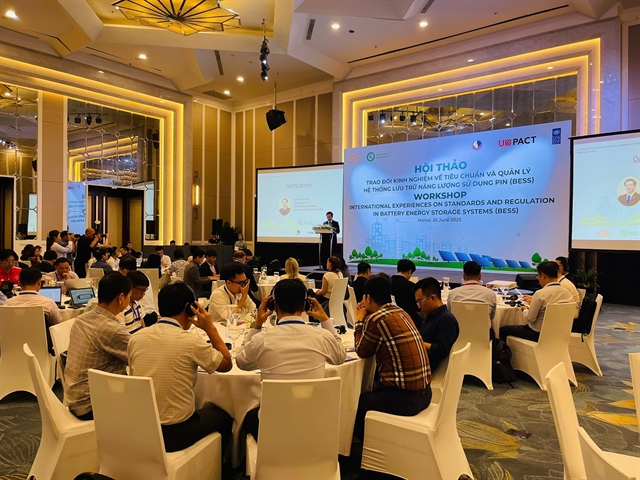.jfif) Opinion
Opinion


|
| Representatives discuss battery energy storage systems during the workshop. — VNS Photo Thu Trang |
HÀ NỘI — Amid a strong energy transition and Việt Nam’s efforts to fulfil its commitments to achieve net zero emissions by 2050, the research and deployment of Battery Energy Storage Systems (BESS), along with their integration with renewable energy solutions, have become an urgent necessity.
Experts agreed on this necessity during a workshop titled ‘Sharing experiences on standards, regulations and management of battery energy storage systems’ held on Thursday in Hà Nội.
The workshop, organised by the Commission for Standards, Metrology and Quality of Việt Nam (STAMEQ), in collaboration with the United Nations Development Programme (UNDP), aims to strengthen the development of national standards in this field, as well as raise awareness and enhance international cooperation.
The event brings together leading experts from the US, South Korea, China, Singapore, Malaysia and Việt Nam, along with representatives from regulatory agencies, businesses, research institutes and international organisations working in the fields of standards and energy.
It aims to promote the harmonisation of national standards with international practices, while also strengthening Việt Nam’s capacity in the development, testing and certification of BESS.
STAMEQ Chairman Hà Minh Hiệp said that the workshop held special significance as Việt Nam is implementing its commitment to a just energy transition and achieving net zero emissions by 2050.
“In this process, energy storage systems are not only a technological solution but also an essential component to ensure power system stability, optimise renewable energy sources and enhance backup capacity in increasingly unpredictable climate conditions. To deploy BESS safely, effectively and at scale, a suitable system of standards, technical regulations and management mechanisms is required,” he said.
Experience exchange
Since the Political Declaration on establishing the Just Energy Transition Partnership (JETP) with Việt Nam was announced in December 2022, Việt Nam has responded by setting up the JETP Secretariat and specialised working groups and developed the Resource Mobilisation Plan, which outlines key policies and a list of priority projects to realise the country’s energy transition roadmap.
In this process, investing in the development of energy storage systems acts as a foundation in addressing the intermittency of renewable energy, enhancing system flexibility, improving the reliability and resilience of the power grid, supporting the development of a smart transmission network and ensuring national energy security.
Establishing national standards and regulations for BESS is crucial for reducing technical and financial risks and creating a clear legal framework to attract both domestic and international investment in Việt Nam’s energy transition projects, particularly JETP projects.
Climate Counsellor at the UK Foreign, Commonwealth and Development Office Anna Gibson said: “Developing standards for energy storage systems is crucial to ensure safety and reliability, promote technical consistency and quality assurance, align with international practices, support financial mobilisation and build investor confidence, while also enabling effective integration into the power grid.”
Representative of UL Standards & Engagement Kolin Low shared insights on international standards related to the safety and installation of BESS, along with widely adopted technical practices.
The Institute of Energy under the Ministry of Industry and Trade presented Việt Nam’s policy directions, highlighting the role of energy storage in demand response and improving the operational efficiency of the power system.
Liang Tang, Deputy Secretary-General of the China Energy Storage Alliance, highlighted technical regulations and international cooperation strategies aimed at building a sustainable BESS ecosystem.
Senior Researcher at the Korea Testing Certification Institute, Kim Taemin, introduced the BESS certification programme in South Korea, highlighting its strict technical requirements and inspection procedures.
From the perspective of enterprises, Võ Lê Duy Đức, Director of the Key Accounts Division at VINENERGO Energy Joint Stock Company, confirmed that the domestic development of BESS could help reduce import costs, enhance technological self-sufficiency and promote the local supply chain.
Deputy Resident Representative of UNDP in Việt Nam, Patrick Haverman, also spoke at the workshop, praising the will to collaborate among stakeholders.
“Today’s workshop has demonstrated the tremendous potential of energy storage systems in supporting a just energy transition, while also outlining concrete steps to turn ambition into action,” he said.
“Removing technical barriers and creating an enabling environment will be key to enhancing energy storage capacity in line with the objectives of Việt Nam’s Power Development Plan 8,” he added.
Through the workshop, the Việt Nam Institute of Standards and Quality and UNDP hope to further expand cooperation with stakeholders in the fields of standards and energy, from regulation development, testing and certification to domestic manufacturing and effective integration into the national power grid.
This serves as a practical foundation contributing to the realisation of Việt Nam’s goals for green, just and sustainable development. — VNS




